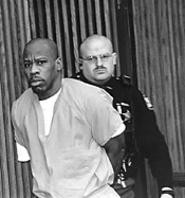His vigilance was prompted by the erratic behavior of the defendant, Jephthah Jackson, whose retrial for felonious assault was to begin on January 22. It did not. Jackson had stopped speaking to his attorney a week before. On the day he was due in court, he refused to leave his cell or change out of jail-issued orange togs into something more presentable to a jury. Matia ordered Jackson hauled to court "by any means necessary."
Jackson was delivered to the courtroom, but once there, it was soon obvious the case would not proceed. As defense attorney Fernando Mack detailed his client's lack of cooperation, Jackson bent forward and pressed his forehead to the table. Matia, realizing that Jackson wasn't going to lift his head anytime soon, postponed the trial and ordered a psychiatric evaluation.
Jackson has proved to be a most elusive defendant. His first conviction was overturned on appeal, and he's managed to delay the retrial for six months. In his version of events, "the system" -- which includes a succession of defense lawyers -- is harassing him with a bogus case. He presents a bewildered face. "Right now, I can't really explain anything to no one, because I don't have enough information myself," he says by phone from the county jail. "I would be telling you lies if I told you anything about this case."
Cell-block philosophers often speak of American criminal justice as a cold and unfeeling system, but mainly it's the family of last resort. Most of the court's time is spent parenting people who can't take care of themselves or don't play well with others. Jackson believes the case against him is bogus, yet thus far the system has bent over backward on his behalf. His is not a cautionary tale, but an almost reassuring one: In court, every misfit has his day.
Jephthah Jackson is a short, well-built, 38-year-old ex-con.
The son of a baker, he grew up in Cleveland, dropped out of high school after the 11th grade, and found his way into the penal system. In 1992 he was sent to prison for drug abuse and attempted felonious assault. He served seven years.
Jackson earned a GED during his incarceration; after release, he worked as a machinist. On the surface, his life appeared headed in the right direction, but the emotional shackles of institutionalization don't loosen easily. He was arrested nine months after his parole.
On January 6, 2000, Jackson, his brother Jairus, and Clarence White drank beer and watched television at Jackson's brother's house. Jackson and White began to exchange insults that apparently culminated with White telling Jackson to "suck my dick."
White later told police the comment was made in jest, but according to state's evidence presented at the first trial, Jackson didn't find it funny. He rose from his chair, asked White to set down his beer, and punched him in the eye. A second punch landed on White's nose.
White went home. The next day, the eye wouldn't stop bleeding, so he admitted himself to Metro hospital. He had sustained a broken nose, two broken orbital bones, and a laceration to his eyeball. Doctors operated on the eye, but even today, it is a murky pink, and White cannot see from it.
White didn't report the alleged attack for three days. He told police he feared retaliation.
At trial, Jackson's brother testified that no fight had occurred in the house that night. Jephthah and White had argued (over a sock), Jairus said, but White was asked to leave before the dispute escalated.
One dead eyeball, two different accounts. Such is life in the court of common pleas. What makes State of Ohio vs. Jephthah Jackson unusual is the defendant's unwillingness to get with the judicial program.
Before the first trial could begin, Jackson fired not one but two lawyers. He felt they were keeping him from inspecting the evidence. His second attorney, public defender Mark Stefan, told the court that Jackson was "adamant" about representing himself. Matia asked Jackson if he wanted to waive his right to counsel.
"Right," Jackson responded, adding that he had a "strange feeling somebody is tampering with my file." Matia granted the request, but ordered Stefan to stand by and answer questions Jackson might have.
Jackson mounted a pathetic defense, even by the standards of self-representation. When the trial convened, Matia asked him what witnesses he intended to call.
"What part of -- what stage are we anyway during this trial?" a clueless Jackson asked. "What is this?"
"This is a trial date, Mr. Jackson," Matia said. "We are four minutes away from bringing the jury in to pick the jury to decide your case."
Later, Jackson asked for a continuance so that he could subpoena witnesses. "Mr. Jackson, when you fire two competent attorneys, what did you expect?" Matia shot back. "Where did you go to law school? Who was going to do this for you?"
Stefan did what he could, but Matia prevented him from filing motions or making a closing statement. He was allowed to cross-examine White, owing to the complexity of the medical report.
The jury, not surprisingly, found Jackson guilty of felonious assault. He was sentenced to eight years in prison.
The case, as with all criminal trials that end in conviction, was automatically appealed. Jackson's new attorneys -- also paid for by the state -- argued that Matia failed to determine whether Jackson knew what he was doing when he waived his right to counsel.
The appeals court ruled for Jackson, saying he had no idea what self-representation involved. They also said that Jackson was denied a chance to examine the victim's statement prior to trial.
If the parties hoped for a fresh start after the first verdict was repealed, it wasn't coming. At a pretrial hearing last September, Matia asked Jackson if he had found an attorney.
"I can't comment on that right now," Jackson said.
"Mr. Jackson, the time to comment is now," Matia said.
Jackson fumbled for words, so Matia assigned the case to Mack. "Send him away," the judge said. "Have a nice lunch. Wouldn't want him to miss his gym time."
Matia was frustrated with Jackson and also upset with himself. Of the first trial, he later said from the bench, "I dropped the ball on that one. I didn't realize I was charged with responsibility of saving him from himself."
Jackson's competency was now an issue. In November he was interviewed by psychologist Nancy Huntsman, who decided that he was fit to stand trial. Huntsman wrote that Jackson comprehended the charge against him and the possible consequences, and that he was able to articulate the roles of the judge, the prosecutor, and the defense attorney.
While sane enough for trial, Huntsman found, Jackson is not the picture of mental health. The psychologist diagnosed a severe and growing form of paranoia. Jackson told her that his parole officer was a gang operative who had drugged him with Visine, and he believed his arrest for White's beating was the product of a conspiracy. "I recently found out who actually beat the guy up," Jackson said. "Turned out it was my brother. [Jairus and White] tried to set me up."
Jackson, when asked about the night in question, would not elaborate: "I'm not going to get off into that, because if they don't have a case, there's no reason why I should speak on that. No offense, you know what I'm saying. I just don't feel it's even necessary to even talk about that."
Matia, Mack, and Assistant Prosecutor Mike King all were unwilling to hold a trial with Jackson's faced buried in the defense table. Indeed, removing his handcuffs seemed a dicey proposition. For want of anything better to do, Matia ordered another psychiatric evaluation.
When it was evident there would be no trial, Jackson lifted his head. He sat calmly before the deputies led him away without struggle.
A new trial date has been set for March. If Jackson is again found competent, Matia will be sure to hold his hand throughout the process. "The only thing worse than trying a case twice is trying a case three times," he says.
He can lead a defendant to due process, but he can't make him drink. Jackson says he has no plans to participate in his defense. "He don't need my help," he says of his attorney. "The evidence is there. He don't need my hearsay, my say-so, or nothing. What is it he needs me to say? Yes, no, hi, hello, what? I don't understand it. Whether I'm there or not, it's not like it's going to make a difference.
"I'm already locked up. They can't give me no more than what I already have."














